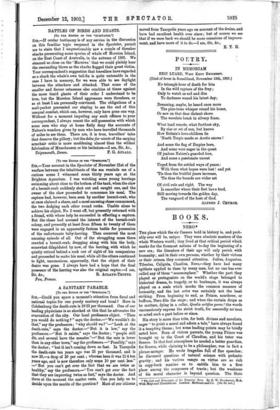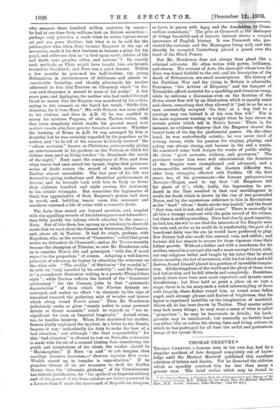BOOKS.
NERO.*
THE place which the six Caesars hold in history is, and prob- ably ever will be, unique. They were absolute masters of the whole Western world ; they lived at that critical period which marks for the foremost nations of to-day the beginning of a new era ; the literature of their age will only perish with humanity ; and in their own persons, whether by their virtues or their crimes, they command attention. Julius, Augustus, Tiberius, Caligula, Claudius, Nero,—they have had many epithets applied to them by many men, but no one has ever called any of them "commonplace." Whether the part they played as protagonists on the world's stage belonged to historical drama, to tragedy, or to burlesque, it was always played on a scale which mocks the common measure of humanity, and the last actor was certainly not the least striking. From beginning to end, as Prince, murderer, or buffoon, Nero fills the stage ; and when the curtain drops as he mutters, dying in a cellar, Queue artifez pereo ! the words unconsciously express the strict truth, for assuredly no•man so acted such a part before or since.
His story is more than trite, for both divines and novelists, eager "to point a moral and adorn a tale," have always found it a tempting theme ; but some leading points may be briefly noted here. Born of vicious parents, the young Prince was brought up in the Court of Claudius, and his tutor was Seneca. In that foul atmosphere he needed a better guardian, for Seneca, while claiming to be a philosopher, was in fact a phrase-monger. He wrote tragedies full of fine speeches ; he discussed questions of natural science with pedantic gravity ; and his various essays on virtue are so rich in copy-book maxims as to entitle him to a first place among the composers of tracts ; but the weakness of his moral character is beyond question. The Stoic • The Life and Principate of the Emperor Nero. By B. W. Henderson, IILA, With Naps and Illustrations. Loudon: Methuen 8.nd Co. [105. 6d. not. J who amasses three hundred million sesterces by usury— he had at one time forty millions lent on British securities— perhaps only provokes a smile when he writes infirmi animi est pail non posse divitias; but what is to be said for the philosopher who, when Nero became Emperor at the age of seventeen, made it his first business to become a pimp for his pupil, and addresses him as "a God upon earth, arbiter of life and death unto peoples, cities, and nations " ? By exactly such methods, as Plato might have taught him, are tyrants trained to bloodshed; and Nero was a quick learner. Within a few months he poisoned his half-brother, the young Britannicus, in circumstances of deliberate and almost in- ionceivable brutality, and shortly afterwards his teacher uldressed to him that Treatise on Clemency which "in fer- rour and eloquence is second to none of his works." A few years pass, and Agrippina, the mother who had waded through blood to secure him the Empire, was murdered by his orders, crying to the assassin as she bared her womb, "Strike this, Anicetus, for it bore Nero." His wife Octavia was soon added to his victims, and thus in A.D. 62 he was enabled to marry his mistress Poppaea, of whom Tacitus writes, with that stern simplicity which marks his gravest mood, huic mulieri cuncta alia fuere praeter honest ant. animum. Whether the burning of Rome in A.D. 64 was arranged by him is doubtful, but he was certainly regarded by the populace as its author, and "to be rid of the rumour he falsely accused" the "odious sectaries" known as Christians, subsequently giving an entertainment in his gardens on the Vatican at which his victims were used as living torches "to illuminate the revels of the night." Next came the conspiracy of Piso, and then when terror had once seized the tyrant, begins that gruesome series of death scenes the record of which makes even Tacitus almost unreadable. The last year of his life was devoted to giving recitations and theatrical performances in Greece, and he brought back with him to Italy no fewer than eighteen hundred and eight crowns, the testimony to his artistic triumphs. But meantime the legionaries of Gaul, less appreciative of their Emperor's genius, had risen in revolt, and, babbling heroic verse, this mummer and murderer crowned a life of crime with a coward's death.
The facts thus stated are beyond question, and, coupled with the appalling records of his extravagance and debauchery. they fully justify the infamy which attaches to the name oi Nero. But of late there has sprung up a tendency to discredit much that we read about the Caesars in Suetonius, Dio Cassius, and, above all, in Tacitus. It had its origin, perhaps, with Napoleon, who, as the reviver of "Caesarism," called that great writer un detracteur de l'humanite; and as Mr. Tarver recently became the champion of Tiberius, so now Mr. Henderson asks us to consider Nero's life and wincipate "with due if novel regard to the proportion" of events. Adopting a well-known principle of advocacy, he begins by attacking the witnesses on the other side. "The avidity" of Suetonius "for scandal is," he tells us, "only equalled by his credulity"; and Dio Cassius is "a second-rate Suetonius writing in a pseudo-Thucydidean style " ; while Tacitus reflects the hatred of the "Senatorial aristocracy" for the Caesars, joins in that "systematic depreciation" of them which the Flavian dynasty en- couraged, and makes no effort "to dissipate by the rays of historical research the gathering mist of wonder and horror which clung round Nero's name." Then Mr. Henderson judiciously omits or gives "scanty notice to some personal details or Court scandals," which he regards as " too in- significant for even an Imperial biography." Actual crime, too, he handles tenderly. When Nero murdered his mother, Seneca kindly explained the incident in a letter to the Senate, because it was "undoubtedly his duty to make the best of a bad situation," and although "the final responsibility" for this "bad situation" is allowed to rest on Nero, the concession is made with the air of a counsel hinting that, considering the youth and temptations of his client, the verdict should be "Manslaughter." If Nero "is said" to rob temples, then sacrilege becomes harmless,—"Deorum injuries Deis curae. Wealth stored up in temples is unproductive." If he plunders Greece of its art treasures to deck his Golden House, then the "altruistic gluttony" of his Commissioner has historic justification, for "the spoils of an Imperial robbery and of the general of the Sans-culottes are better preserved in a Louvre than if made the dice-board of Republican troopers, or hewn in pieces with Agag and the Amalekites by Crom- wellian iconoclasts." The gibe at Cromwell as the destroyer
of things beautiful and of historic interest shows a warped ignorance of English history. It was Cromwell who pre- vented the cartoons and the Mantegnas being sold, and who directly he occupied Canterbury placed a guard over the tomb of the Black Prince.
But Mr. Henderson does not always thus plead like a criminal advocate. He often writes with power, brilliancy,
and charm. His account of Acts, the slave-girl whose love for Nero was found faithful to the end, and his description of the death of Britannicus, are small masterpieces. His history of the Parthian War and the rising in Britain is admirable. Petronius, "the Arbiter of Elegance," and the banquet of Trimalchio afford material for a sparkling and vivacious essay, while he enlivens a discussion even on the doctrine of the Stoics about free will by an illustration which is equally exact and clever, remarking that they allowed it "just in so far as a man contentedly accepted his fats,' as a dog tied to a carriage may run behind it of his own free will." Nor is his main argument wanting in weight when lac lays stress on certain points which tell in Nero's favour.' There is, for instance, no evidence whatever that the Emperor shared the brutal taste of his day for gladiatorial games. On the other hand, he was undoubtedly artistic; he was never tired of writing verses, while his passion for singing, playing, and acting was always strong, and became in the end a mania. He conceived some bold designs for works of public utility. He chose "good servants, soldiers, and governors." The provinces under him were well administered, the frontiers of the Empire were strengthened and advanced, and a statesmanlike settlement of the Eastern difficulty was, after long struggles, effected with Parthia,. Of the first years, too, of his government—the famous qUinquennium Neronis--Trajan used to say that "all Emperors fell far short of it"; while, lastly, the impression he pro- duced in the East resulted in that real unwillingness to credit his death which is shown by the rise of two pretended Neros, and by the mysterious reference to him in Revelations as the " head " whose "death-stroke was healed," and the beast "that was, and is not, and shall come." There is assuredly in all this a strange contrast with the grim record of his crimes, but there is nothing startling. Nero had clearly good capacity; he had, too, the wit to see that the interests of the Empire were his own, and, as far as he could do it comfortably, the part of a beneficent deity was the one he would have preferred to play. But Nature had also made him sensual, vain, and selfish; and fortune did her utmost to secure for these vigorous vices their fullest growth. Without a father and. with a murderess for his mother, reared in a corrupt city and a more corrupt Court, with- out any religious belief, and taught by his tutor that he stood above morality, the lad of seventeen, with his hot blood and wild desires, found himself placed in a position of incredible tempta- tion. All the kingdoms of the world and the glory of them were laid before him, and he fell utterly and completely. Doubtless, indeed, there have been men more reprobate and tyrants more bloodthirsty; but Nero held so great a place on so vast a stage, there is in his story such a weird intermingling of farce with tragedy, there flicker round him, as round some fallen angel, such strange gleams and flashes of brightness, that his figure is imprinted indelibly on the imagination of mankind. Above all, he has been drawn by Tacitus. That master artist may lack many things ; he may want a sense of what is called " proportion" ; he may be inaccurate in details; his back- grounds may be unlaboured ; but assuredly no feebler hand can either blur or soften the strong lines and living colours in which he has portrayed for all time the awful and portentous image of the tyrant Nero.



























































 Previous page
Previous page